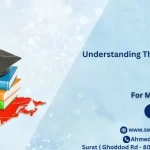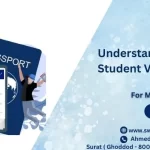
IELTS is on mind of many students who want to pursue their higher education in foreign countries and plan to Study in United Kingdom, Study in United States, Study in Canada, Study in Australia, and others.
Students from non-native English-speaking countries must give an English language test to get admission to international universities.
IELTS (International English Language Testing System) is one of the best exams accepted in all countries for admission to international universities or institutions in native English-speaking countries.
If you want to get admission to international universities, you will have to crack the IELTS exam, where English is the primary communication language.
You need to thoroughly prepare for the IELTS exam if you want to get a high score.
The methods that follow will both provide a solution to your query, \”How To Crack IELTS In 15 Days,\” and serve as a roadmap for improving your test results:
Day-#1: Understand the Structure | How To Crack IELTS Exam In 15 Days
If you want to discover how to pass the IELTS exam in 15 days, you must comprehend how the test is structured. Reading, writing, speaking, and listening are among the four sections of the IELTS exam. When you take the IELTS exam, you will be more capable of answering the questions once you are familiar with the pattern, Questions types and methods to solve each one of them.
Day-#2: Learn Grading & Evaluation Parameters | How To Crack IELTS Exam In 15 Days
Once you’re confident about the structure, the next thing to understand is the assessment & grading pattern, as well as other relevant details, so that the entire structure and format are clear.
Day-#3: Gain Confident in Reading Module | How To Crack IELTS Exam In 15 Days
Start your exam preparation with this because reading and comprehension are among the simpler components. To learn how to read faster, find old papers, study the format, and attempt to answer one question while keeping a timer going.
Day-#4: Comprehension | How To Crack IELTS Exam In 15 Days
This day should be spent mastering your comprehension skills. Practise reading and solving as many passages as you can find. Make a note of how much time you require for each question type.
Day-#5: Reading Techniques: Skimming & Scanning
You should become proficient in reading quickly and skimming to discover the answers while passing over any extraneous elements in the passage.
Day-#6: Practice Full-length Reading Passages
After learning various strategies for acing the reading section, try out a lengthy text today.
Day-#7- Listen to English podcasts & materials
Get ready for the IELTS listening section this week. It would be advisable to start by listening to English-language podcasts and other preparation materials.
You will become more accustomed to diverse English accents as a result. You can gain a very thorough understanding of many dialects and tones by listening to BBC news programmes, interviews, adverts, etc.
Day-#8: Solve IELTS Listening Questions
Spend this day working on actual listening question types. Give yourself enough time at first and listen to the audio clips repeatedly if needed. This will give you some familiarity with the exercise. However, keep in mind that in the IELTS test, the audio is only played once, so you should practise listening with focus.
Day-#9 & 10: Speak to Someone Fluent in English
You should converse with someone who speaks English well rather of just working on your own, which is a great concept. Speaking English with your friends and family on a regular basis will help you become more confident and at ease with the language.
You typically require a lot of practise and a language instructor if you want to perform well on the IELTS speaking test. You can become fluent in the language by working with IELTS coaches. SWEC has coached 1000+ students to achieve IELTS band scores of seven or higher.
Day-#11: Learn Idioms
Idioms are common and popular phrases in the English language which expand your vocabulary. Using idioms will also leave a good impression on your examiner.
Day-#12: Develop Your IELTS Writing Vocabulary
Candidates must prepare two essays for the IELTS Writing section. Students must develop a wide range of language and exhibit it. This gives examiners more confidence that you speak English fluently.
Reading the news, identifying challenging terms, and seeking up their synonyms are excellent strategies to expand one\’s vocabulary.
Day-#13: Grammar exercises to revise and improve
You can also prep for IELTS writing with different types of grammar exercises available both online and offline. These exercises can be in the form of ‘fill in the blanks, ‘matching headings’ etc.
Day-#14: Practice Essay Outlines
Finally, spend a day writing essay based on prompts or current events. These will help you organise your thought process and practice essay writing.
Day-#15: Solve 3 Full Mock Test Paper
Many websites offer free mock IELTS tests that help you crack IELTS easily. You can also get books that contain mock test papers. Get your hands on as many mock tests as possible and keep taking them.






